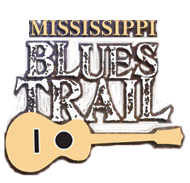Junior Kimbrough
Junior Kimbrough - Holly Springs
A distinctive artist whose “cotton patch blues” had a hypnotic quality, David Kimbrough, Jr. (1930-1998) was born in Hudsonville and played actively at clubs in the Holly Springs area beginning in the 1950s. During the 1990s, recordings by Kimbrough achieved international attention, as did the juke joint he operated at this location, “Junior’s Place.”* His musical legacy was continued by artists including his sons David, Kinney and Robert, and grandson Cameron.
Junior Kimbrough was born David Kimbrough Jr. near Hudsonville, just north of Holly Springs, on July 28, 1930, and began learning guitar at age eight from his father, who he regarded as his greatest influence. His older brothers Duke, Felix and Grady, and older sister, Callie, also played music, and local musicians who Kimbrough recalled visiting the family home included Mississippi Fred McDowell, Eli Green, Gus Cannon and Johnny Woods. In his teens Kimbrough sang in a gospel group, and by the late ‘50s had formed the first incarnation that became known as his “Soul Blues Boys,” which played at weekend functions in the area and included musicians Earl “Little Joe” Ayers, George Scales, and Winston “Juju” Doxey.
Kimbrough made his first recordings in 1966 for Mississippi native Quinton Claunch’s Goldwax label, although they were not released at the time, and in 1967 he recorded for Memphis’ Philwood label as “Junior Kimbell.” In 1977 the popular UK radio show “Charlie Gillett’s Honky Tonk” featured a recording of Kimbrough’s “[Meet Me] In the City,” recorded by Anthony Wall in 1976 and issued on a UK compilation in 1979. In 1982 folklorist Sylvester Oliver recorded a single of Kimbrough for the High Water label, run by University of Memphis ethnomusicologist David Evans; the label later licensed an album of Kimbrough recordings, Do the Rump, to HMG Records.
Kimbrough gained broader exposure in 1992 when he was featured in Robert Mugge’s documentary Deep Blues, and he recorded his debut Fat Possum album All Night Long at his juke joint here in Chulahoma.* During Kimbrough’s Sunday night performances here, he played with his sons David (Malone) and Kinney (Malone), R.L. Burnside’s sons Joseph and Duwayne, Burnside’s son-in-law Calvin Jackson, and Jackson’s son Cedric Burnside.
Junior’s Place attracted both University of Mississippi students and international blues fans, and his multiple Fat Possum albums featuring his riff-based songs with minimal chord changes and droning bass lines found an audience with fans of alternative music—artists who covered his music included the North Mississippi Allstars, the Black Keys, Iggy Pop and Daft Punk. Another artist influenced by Kimbrough was fellow Hudsonville native, rockabilly pioneer Charlie Feathers (1932-1998), whose quote “Junior Kimbrough is the beginning and end of all music” is featured on Kimbrough’s gravestone and inspired the name of an Oxford record store. Kimbrough died in 1998, and his music was carried on locally by his family members at multiple juke joints and festivals that celebrated local blues styles.
Text by Scott Barretta. Research assistance: David Evans, Bill Steber, Jim O’Neal and Brenda Kee, Vital Records, Mississippi State Department of Health. This is marker No. 215 on the Mississippi Blues Trail, dedicated February 21, 2024. For more information on these artists, see marker No. 45, Hill Country Blues, in Holly Springs.
* This marker was originally scheduled to be placed at the site of Junior’s Place in Chulahoma.

